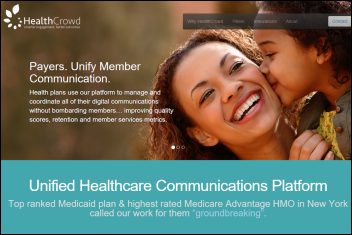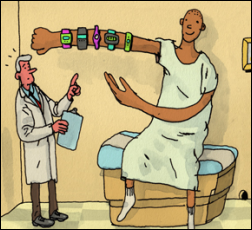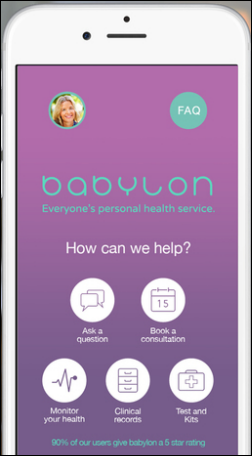Giving a patient medications in the ER, having them pop positive on a test, and then withholding further medications because…
News 11/25/15
Top News
Health Data Consortium turns over the spring Health Datapalooza conference to the non-profit AcademyHealth, saying it’s time to shift its theme from data liberation to data application. I attended one event and didn’t find it all that interesting, but it seems to have developed a following, particularly among people who seem to spend most of their working lives traveling conspicuously to conferences of questionable value to their doting employers. I’m not really clear about what else the membership-supported Health Data Consortium does beyond writing lofty vision and mission statements. It was created by an advertising agency working for the federal government and some non-profits.
Reader Comments
From Parse Person: “Re: ACA deductibles. The ACA passed over five years ago after years of debate. How is it only now, in its second active year, are we realizing that the average American doesn’t have the savings to pay a multi-thousand dollar deductible? The US savings rate has been at or below zero for quite a long time and mountains of actuaries and accountants studied the ACA details since the debate first began.” The ACA was a reasonably good idea that was hacked to pieces by high-powered insurance and pharma lobbyists whose own actuarial prowess is legendary. Insurance companies realized they could jack up prices as much as they wanted or needed in the supposedly competitive Healthcare.gov marketplace, while drug companies enjoyed a big sales uptick without any additional pricing pressure. The biggest flaw in the ACA is that it addressed health insurance, not healthcare and its cost, and had to compromise nearly everything to draw enough political support to pass. I don’t think anyone expected premiums and deductibles to jump so quickly or for inexpensive, high-deductible catastrophic plans to morph into expensive, high-deductible regular plans. However, I’m optimistic that ACA’s dramatic setbacks will either be reversed within a year or two as risk pools become more predictable or its spectacularly expensive failure will convince more people that the system we’ve allowed to happen is unsustainable without paying more attention to the high cost of everything related to healthcare, ranging from million-dollar hospital CEO salaries to drug companies worth hundreds of billion dollars to insurance companies that always seem to emerge from the scrum with our wallets in their hands. Our US problem isn’t overutilization, it’s cost, and one person’s high medical costs is the high income of another person who won’t give it up without a fight.
HIStalk Announcements and Requests
HIStalkapalooza (and thus, by inference, the HIMSS conference) is just three months away. We’ve booked the venue and band, we will have a fun cast of industry characters involved as always, and I’ll be ordering beauty queen sashes before you know it. I have capacity for another sponsor or two if your company would like to join an impressive list of those that have already signed up. Contact Lorre. She can also help if your company is planning next year’s budget and wants to sponsor HIStalk, which quite a few vendors have done recently (thanks!)


Mrs. Gamache from Florida sent photos of her gifted students, saying they are excited to be working with the LEGO Mindstorms robot we provided via DonorsChoose, using its drag-and-drop programming to make it move and perform tasks. Also checking in was Mrs. McKnight of South Carolina, who says she immediately started using the copy paper and ink we provided to replace that which was lost in flooding there, allowing her to prepare materials for students to take home for self-study. She added, “I gathered my students during our morning meeting and told them that someone donated the supplies to our class. They were so thrilled. My students began cheering!”
Webinars
December 2 (Wednesday) 1:00 ET. “The Patient is In, But the Doctor is Out: How Metro Health Enabled Informed Decision-Making with Remote Access to PHI.” Sponsored by Vmware. Presenters: Josh Wilda, VP of IT, Metro Health; James Millington, group product line manager, VMware. Most industries are ahead of healthcare in providing remote access to applications and information. Some health systems, however, have transformed how, when, and where their providers access patient information. Metro Health in Grand Rapids, MI offers doctors fast bedside access to information and lets them review patient information on any device (including their TVs during football weekends!) saving them 30 minutes per day and reducing costs by $2.75 million.
December 2 (Wednesday) 1:00 ET. “Tackling Data Governance: Doctors Hospital at Renaissance’s Strategy for Consistent Analysis.” Sponsored by Premier, Inc. Presenters: Kassie Wu, director of application services, Doctors Hospital at Renaissance; Alex Eastman, senior director of enterprise solutions, Premier, Inc. How many definitions of “complications” (or “cost” or “length of stay”…) do you have? Doctors Hospital at Renaissance understood that inconsistent use of data and definitions was creating inconsistent and untrusted analysis. Join us to hear about their journey towards analytics maturity, including a strategy to drive consistency in the way they use, calculate, and communicate insights across departments.
December 2 (Wednesday) 2:00 ET. “Creating HIPAA-Compliant Applications Without JCAPS/JavaMQ Architecture.” Sponsored by Red Hat. Presenters: Ashwin Karpe, lead of enterprise integration practice, Red Hat Consulting; Christian Posta, principle middleware architect, Red Hat. Oracle JCAPS is reaching its end of life and customers will need a migration solution for creating HIPAA-compliant applications, one that optimizes data flow internally and externally on premise, on mobile devices, and in the cloud. Explore replacing legacy healthcare applications with modern Red Hat JBoss Fuse architectures that are cloud-aware, location-transparent, and highly scalable and are hosted in a container-agnostic manner.
December 3 (Thursday) 2:00 ET. “501(r) Regulations – What You Need to Know for Success in 2016.” Sponsored by TransUnion. Presenter: Jonathan Wiik, principal consultant, TransUnion Healthcare Solutions. Complex IRS rules take effect on January 1 that will dictate how providers ensure access, provide charity assistance, and collect uncompensated care. This in-depth webinar will cover tools and workflows that can help smooth the transition, including where to focus compliance efforts in the revenue cycle and a review of the documentation elements required.
December 9 (Wednesday) 12 noon ET. “Population Health in 2016: Know How to Move Forward.” Sponsored by Athenahealth. Presenter: Michael Maus, VP of enterprise solutions, Athenahealth. ACOs need a population health solution that helps them manage costs, improve outcomes, and elevate the care experience. Athenahealth’s in-house expert will explain why relying on software along isn’t enough, how to tap into data from multiple vendors, and how providers can manage patient populations.
December 9 (Wednesday) 1:00 ET. “The Health Care Payment Evolution: Maximizing Value Through Technology.” Sponsored by Medicity. Presenter: Charles D. Kennedy, MD, chief population health officer, Healthagen. This presentation will provide a brief history of the ACO Pioneer and MSSP programs and will discuss current market trends and drivers and the federal government’s response to them. Learn what’s coming in the next generation of programs such as the Merit-Based Incentive Payment System (MIPS) and the role technology plays in driving the evolution of a new healthcare marketplace.
December 16 (Wednesday) 1:00 ET. “A Sepsis Solution: Reducing Mortality by 50 Percent Using Advanced Decision Support.” Sponsored by Wolters Kluwer Health. Presenter: Stephen Claypool, MD, medical director of innovation lab and VP of clinical development and informatics for clinical software solutions, Wolters Kluwer Health. Sepsis claims 258,000 lives and costs $20 billion annually in the US, but early identification and treatment remains elusive, emphasizing the need for intelligent, prompt, and patient-specific clinical decision support. Huntsville Hospital reduced sepsis mortality by 53 percent and related readmissions by 30 percent using real-time surveillance of EHR data and evidence-based decision support to generate highly sensitive and specific alerts.
December 16 (Wednesday) 1:00 ET. “Need for Integrated Data Enhancement and Analytics – Unifying Management of Healthcare Business Processes.” Sponsored by CitiusTech. Presenters: Jeffrey Springer, VP of product management, CitiusTech; John Gonsalves, VP of healthcare provider market, CitiusTech. Providers are driving consumer-centric care with guided analytic solutions that answer specific questions, but each new tool adds complexity. It’s also important to tap real-time data from sources such as social platforms, mobile apps, and wearables to support delivery of personalized and proactive care. This webinar will discuss key use cases that drive patient outcomes, the need for consolidated analytics to realize value-based care, scenarios to maximize efficiency, and an overview of CitiusTech’s integrated healthcare data enhancement and analytics platform.
Contact Lorre for webinar services. Past webinars are on our HIStalk webinars YouTube channel.
Acquisitions, Funding, Business, and Stock
Payer mobile messaging platform vendor HealthCrowd raises $2.1 million. Co-founder Neng Bing Doh is a UW-Madison computer science graduate who started out as software engineer at InstallShield and HP, while co-founder Bern Shen, MD, MPhil is a double-boarded physician who ran a VA ED and served as a South Pole doctor, later becoming chief healthcare strategist for Intel.
Drug company Pfizer will buy Allergan for $160 billion, with one of Allergan’s prized jewels being that it is headquartered in Ireland, where Pfizer will move its headquarters to reduce its US tax bill. Crafty lawyers structured the deal as the smaller Allergan buying Pfizer, which blocks some US interference even though the merged company will be called Pfizer and will keep Pfizer’s CEO. Merging companies always talk synergy and increased consumer value to wriggle the deal through FTC and SEC concerns, but somehow prices always increase as service falls apart.
People

Patrick Anderson (Ochsner Health System) is named SVP/CIO of Hoag Memorial Hospital Presbyterian (CA).

New York-Presbyterian names Daniel Barchi (Yale New Haven Health System and Yale School of Medicine) as CIO, as he confirmed on HIStalk last week. He replaces the retiring Aurelia Boyer.
Announcements and Implementations
Medical benefits manager EviCore Healthcare will use Merge Healthcare’s iConnect Network Services to manage imaging study prior authorizations.

El Camino Hospital (CA) goes live on Epic with a project cost of $150 million.
Privacy and Security
A Forrester Research report predicts that 2016 will see the first infection of a medical device or wearable by ransomware.
Dell acknowledges a customer-reported security flaw in which the company shipped PCs with a certificate that inadvertently uses the same private key on every device, making it easy for hackers to impersonate that device. Dell has provided instructions for fixing the problem and says its just-released update will remove the certificate entirely.
Technology
The Robert Wood Johnson Foundation funds a project to develop a framework that will allow researchers to port their iOS ResearchKit apps to Android with minimal effort.
Other
KQED discusses biometric patient ID with a mixed level of credibility. It leads off with an overly provocative headline (“Would You Trust a Hospital to Scan Your Fingerprint?”); erroneously declares biometric ID to be “an alternative to a national patient identifier;” and fails to comfort fingerprint-nervous readers that the scanners don’t save the actual fingerprint or look it up in other databases – it simply records a mathematical model of the fingerprint to confirm a match. It does bring up the good point that it’s a big problem if someone were to hack a biometric database because users can change their password but not their fingerprint.
I will extend the premise of MIT Technology Review’s predictable article “Your Doctor Doesn’t Want to Hear About Your Fitness Tracker Data” to posit that “Nobody Gives a Crap About Your Workouts, So Stop Yapping About Them.” There’s no reason other than navel-gazing narcissism to tell a breathlessly anxious world – whether in the break room or on Facebook — about your latest Runkeeper-recorded run or your just-completed kettlebell swing count. The fact that you use a fitness tracker means you’re probably pleased with yourself – it’s the people who don’t use wearables who might elicit a doctor’s exercise question or suggestion that would be worth the time required. Today’s medical model is that you tell your doctor what you’re experiencing in maybe 60 seconds, you get back 2-3 minutes of questions at best based on the doctor’s aggregated experience with other patients, and then the wrap-up is one or more of these options: (a) let me know if it gets worse; (b) get this test performed; (c) take this drug; or (d) go see this other doctor. Nobody is going to turn every encounter into a detailed probe into your health status in return for the small payment they’re getting as the waiting room backs up, so the last thing they want to see is patients waving around their irrelevant Fitbit step counts.
The BBC quotes the founder of a telemedicine company who says, not surprisingly, that the mobile phone will change the face of healthcare. Babylon Health actually looks pretty good, offering online physician consultations via text message or video, appointment scheduling, answering medical questions via text message, and maintaining health records. It’s available only in the UK and Ireland, with UK customers paying $7.50 per month for unlimited consultations between 8 a.m. and 8 p.m with no contract required.

I’m getting hooked on the blog of Chad Hayes, MD, a PGY-3 pediatrics resident at Greenville Health System (SC) and US Naval Academy graduate who describes himself medically as “a skeptic and a minimalist.” He’s a really good writer, to which I submit as evidence “The Presidential Candidates’ Brief Guide to Vaccines” and “On The Seventh Day, The Devil Created Gluten.” I almost never read blogs because those who write them are usually deficient in insight, writing skill, and often both, but this one’s a keeper.
The Internet seems fascinated with the story of a 24-year-old uninsured man who was about to start his first job out of college in Pittsburgh, only to be rushed to an UPMC ED with a subdural hematoma. His uneventful treatment and recovery required only administration of an anti-hemophilia drug and a five-day inpatient stay. UPMC charged him over $1 million while warning him that the total could increase as it adds up the time spent by specialists (he says they spent only 40 seconds per visit each day asking him how he was doing and he said OK). The patient is likely to need the hemophilia drug for life at $200,000 per year, but the medical insurance he finally obtained from his new employer carries such a high co-pay and deductible that he can still barely afford it. The article includes comments from ZDoggMD (Zubin Damania, MD), who adds, “Our electronic health records are not designed for patient care at all—they are designed to be cash registers so the hospital can effectively bill for every little widget.” The patient concludes, “The US healthcare system is corrupt … the fact that it’s there for the sake of profit makes me sick.” UPMC, which pays its CEO $6 million per year, clarifies that the document isn’t actually a bill but rather a total of hospital charges, with the fact that they aren’t the same thing neatly encapsulating much of what’s wrong with the US healthcare non-system.
A study finds that requiring fast food restaurants to include calorie counts on their menu boards did not change consumer behavior a bit in five years – people just ignored the alarmingly high values and kept on choosing unhealthy food. McDonald’s admirably posted its calorie counts early, but I still see most people drinking milkshakes posing as coffee for breakfast and scarfing down piles of greasy fried foods in carefully avoiding the dreaded salads, apple wedges, and bottled water. The Affordable Care Act requires such menu labeling nationwide by 2016. Meanwhile, an investigative report finds that Coke heavily funded an anti-obesity group that promised to help the company avoid the wrath of what Coke calls “public health extremists” who want to use taxes or distribution restrictions to try to convince people to stop sucking down vast quantities of its sugar water like crazed hummingbirds attacking a feeder.
China Southern Airlines apologizes after a passenger with abdominal pain tweeted out that he wasn’t taken to the hospital until 15 hours after the flight’s emergency landing on his behalf. The plane’s captain didn’t open the door until 50 minutes after landing and then crew members argued with with ambulance workers over whose job it was to carry him to the ambulance. He ended up climbing down by himself and having emergency surgery at the hospital. The airline said it will work better with airport medical workers.

Just in time for some spirited RSNA discussion: researchers find that trained pigeons rewarded with food pellets can analyze mammograms and biopsy slides for signs of breast tumors just as well as radiologists and pathologists. One bird, hopefully without a real-world radiologist counterpart, was never able to perform better than just picking randomly.
Sponsor Updates
- Wellcentive is named #172 on the Deloitte Fast 500, also winding up at #2 in Georgia and #6 in healthcare IT overall.
- Visage Imaging will demonstrate Visage 7 multimedia reporting and XML-based reporting integrated with Nuance PowerScribe 360 at Nuance’s booth at RSNA.
- Voalte deploys its 11,000th Zebra mobile hand-held computer.
Blog Posts
- Build Your Best Defense Against Data Breaches with a Mobile Game Plan (PatientSafe Solutions)
Contacts
Mr. H, Lorre, Jennifer, Dr. Jayne, Dr. Gregg, Lt. Dan.
More news: HIStalk Practice, HIStalk Connect.
Get HIStalk updates.
Contact us or send news tips online.









As someone with lifelong chronic health issues who was finally able to switch to a more flexible non-full time schedule so I could have the treatment and surgeries required to manage them successfully thanks to the ACA, I love it. I was finally able to take a job based on quality of life, commute, and the working environment (nice coworkers! supportive managers!) without vetting to their specific health insurance plan covered the drugs and specialists at my state’s world-renown academic medical center. I’m able to remain in the workforce while I take a healthcare semi-sabbatical – more tax revenue short-term and long-term, my job skills stay sharp, and over my lifetime I will cost far less to the country in health costs.
However even with the ACA’s platinum plan, the fact I was able to work at all and get paid “too much” to qualify for a subsidy meant I was on the hook for $4000 of the maximum out-of-pocket expenses I incurred this year on top of the $500 a month premiums I pay towards the $125,000 plus I’ve racked up so far in 2014 in medical expenses. Co-insurance means individuals with platinum plans who have any type of hospitalization or emergency room visit are going to have to pay the maximum out of pocket ($4000) each year. If you make more than $46,000 as a single person, that’s 25% of your income dedicated to healthcare since you are already paying $6000 in premiums a year for the Platinum metal tier plan (remember, since you are buying on the exchange, there’s no using pre-tax dollars for ANY of this!) This is insanely unaffordable for almost all Americans.
Why are not HSAs available to individuals buying on the exchange? Why aren’t exchange buyers being allowed to contribute to their premiums pre-tax and save towards deductibles and out of pockets expenses just like individuals with high deductible health plans? Why aren’t middle class Americans who make more than 4x the poverty level given even a partial match to incentivize them to “save” for something that may occur every year or every few years depending on their luck / health status?
Thanks for referring to the “US healthcare non-system”. The US has a healthcare industry, not a healthcare system (except for Medicare and the VA). It’s an important distinction.
“There’s no reason other than navel-gazing narcissism to tell a breathlessly anxious world – whether in the break room or on Facebook — about your latest Runkeeper-recorded run or your just-completed kettlebell swing count.”
I disagree. Those who do post exercise updates on social media are part of a community of exercising people who encourage each other to keep going. This community is like any other — there are people on the outside and there are people on the inside.